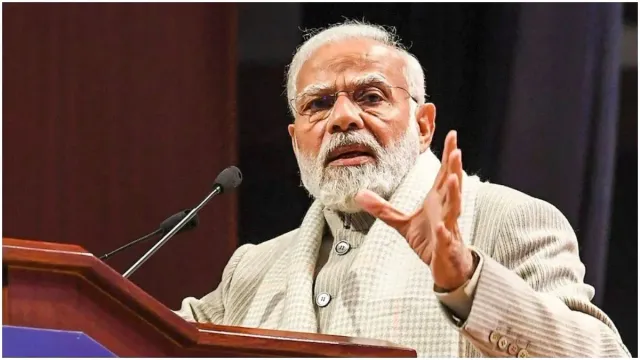- By News Desk
- Tue, 16 Sep 2025 04:52 PM (IST)
- Source:JND
PM Modi 75th Birthday: Prime Minister Narendra Modi’s journey from a grassroots organiser in Gujarat to the nation’s highest office is defined by discipline, strategic vision, and a strong people-centric approach. Rooted in the values of the Rashtriya Swayamsevak Sangh (RSS), PM Modi’s early political work in the 1980s laid the groundwork for the Bharatiya Janata Party (BJP)’s rise in Gujarat. His meticulous planning and ability to mobilise teams reshaped state politics and prepared the path for his leadership as Gujarat’s Chief Minister. His decisive governance during crises, such as the Bhuj earthquake, and focus on infrastructure-driven development brought him national prominence and eventually led to his selection as the BJP’s prime ministerial candidate in 2013.
As Prime Minister, he has combined administrative efficiency with large-scale welfare programs such as the Swachh Bharat Mission and Garib Kalyan Yojana. Internationally, his Vaccine Maitri initiative during the COVID-19 pandemic demonstrated India’s humanitarian leadership. Known for his disciplined lifestyle, personal integrity, and consistent rejection of dynastic politics, PM Modi has remained free of major corruption scandals throughout more than 25 years in government. This article explores the values, qualities, and experiences that have shaped PM Modi’s leadership and sustained his influence in India’s political landscape.
ALSO READ: PM Modi Birthday Special: Prime Minister's Rare Pictures That Highlight His Unparalleled Journey
Gujarat Disaster Handling: Pre-PM Era
After the 2001 Bhuj earthquake, Modi, as Gujarat’s Chief Minister, spearheaded extensive relief and reconstruction efforts, ensuring timely completion with a vision for the future. He introduced the Gujarat State Disaster Management Act in 2003, the first of its kind in India. Under his leadership, Kutch’s recovery flourished, with 300 companies establishing businesses in the region by 2011, transforming it into a hub for tourism and economic activities.,
Run-Up To 2014 PM Candidate Selection By BJP
In 2013, Narendra Modi's selection as the BJP’s Prime Ministerial candidate marked a pivotal moment in Indian politics. At the BJP's National Executive meeting in Panaji, Goa, in June 2013, Modi was named Chairman of the Election Campaign Committee for the 2014 elections. Supported by RSS leader Mohan Bhagwat and BJP president Rajnath Singh, who recognised Modi's popularity, this move strengthened his position, leading to his formal nomination as the PM candidate in September 2013.
Unimpeachable Integrity: Keeping Family Away From Politics
PM Modi has steadfastly kept his family out of politics, contrasting with many leaders who involve relatives in political or business ventures. A critic of dynastic politics, this choice underscores his commitment to integrity, avoiding conflicts of interest and focusing on public service. His mother, Heeraben, has been a constant source of inspiration, often praised by Modi for her influence on his life.
ALSO READ: Narendra Modi Birthday: Inspirational Quotes By Prime Minister Of India On Success And Leadership
A Life-Long Student: Lessons From RSS Senior Leadership, Including Balasaheb
Leaders at the RSS profoundly shaped Narendra Modi's intellectual and spiritual growth through their teachings, actions, and disciplined routines. His time with Balasaheb Deoras during the 1979 Morbi dam crisis was particularly formative, as Modi witnessed how Sangh principles could be applied to real-world service.
Other key figures like Eknath Ranade, Rajju Bhaiya, and Anantrao Kale taught Modi about the power of societal change through spiritualism, education, and grassroots activism. KK Shastri, another important mentor, inspired Modi with the values of a Karmayogi—someone who works tirelessly without expecting rewards. Shastri's example of working 18 hours a day became a model for Modi's discipline and leadership.
Bond With Vakil Sahab
At the age of 8, Narendra Modi met Laxmanrao Inamdar, commonly known as Vakil Saheb. Later on, Modi joined as a Balswayamsevak under Laxamnarao’s guidance. Paying tribute to the legacy of Vakil Saheb, Narendra Modi established an educational and cultural institute named Sanskar Dham in 1992. This institution imparts values and leadership skills to youth.
Exemplary Experiential Learning Skills Throughout Life
From his early days in the RSS to his tenure as Gujarat's Chief Minister, and now as India's Prime Minister, he has demonstrated the ability to learn from diverse experiences. His hands-on approach, whether in grassroots politics or high-level diplomacy, showcases how experiential learning has shaped his leadership style and decision-making, continually driving innovation and progress.

